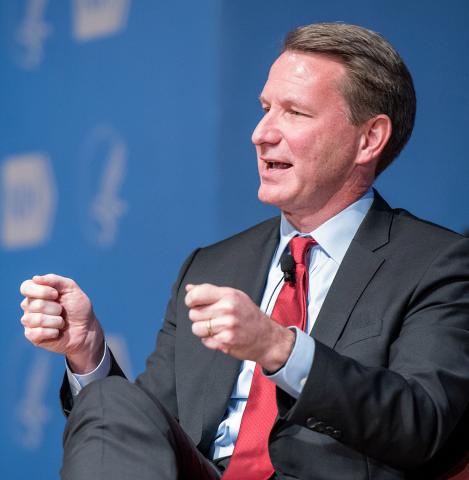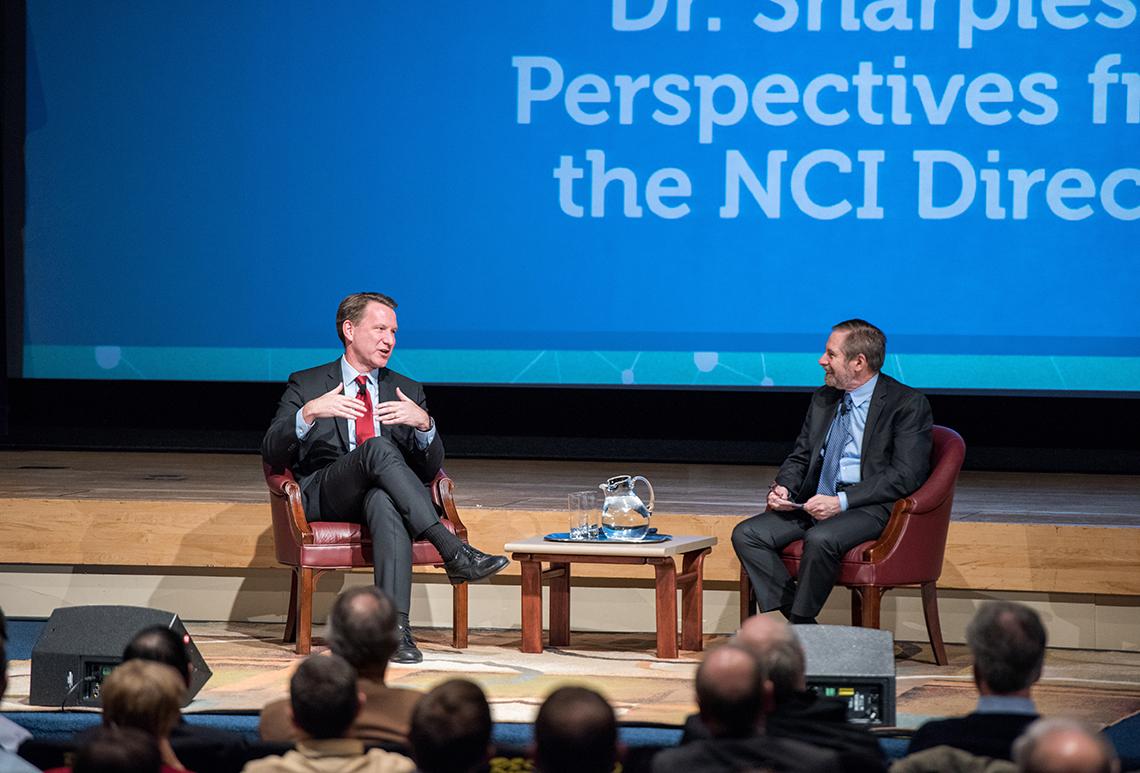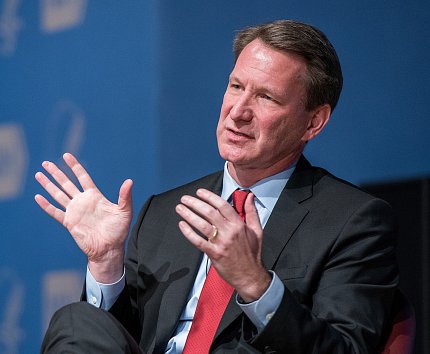New NCI Director Shares Vision at Town Hall Meeting

Photo: Andrew Propp
Call him Ned.
The new director of the National Cancer Institute, Dr. Norman Sharpless, does not want to be called Dr. Sharpless.
“‘Dr. Sharpless’ is my mother, who was a pediatrician. I don’t like that at all,” he said, with a laugh.
He also doesn’t want to be called Norman.
“I tried that for about a year, when I was at NIH [in 1990, between his second and third years of medical school, when he lived in the Cloister and worked in Bldg. 36 at NINDS while a member of the HHMI-Medical Research Scholars Program]. It was super weird—I didn’t like it.”
Recruited to NCI from directorship of the Lineberger Comprehensive Cancer Center at the University of North Carolina at Chapel Hill, Sharpless spent a lively hour Dec. 11 in Masur Auditorium sharing his perspectives on his new job at what he labeled the first town hall meeting of his NCI directorship.
It turns out he is deeply familiar with NIH, is learning more daily as his “listening tour” progresses and has already formed some strong impressions.
“First of all, the research scope of NCI is almost unbelievable—I was truly blown away,” he said. “Each division is like a school of medicine or a school of public health.” He cited as revelations work in cancer disparities, a major study of the effects of the Chernobyl disaster and collaborations with the Department of Defense and the Veterans Administration.
“The scale of these programs gives NCI the scope to do big things,” he said.
Sharpless is particularly impressed by the MATCH (Molecular Analysis for Therapy Choice) Trial. “This is an audacious effort,” he said, noting that initial data from the 1,100-site trial will be published in 2018. “It will change patient care in the United States and the world.”
He also mentioned the Cancer Moonshot (“a tour de force so far”), a variety of approaches to Ras-mutant cancers emphasizing structural biology and research on cellular and immunologic therapies currently ongoing in Bldg. 10. “This is the only place in the world where this is happening—that’s remarkable.
“Lastly, what most impresses me is the passion and dedication of the people…who are working tirelessly,” said Sharpless, who noted that he has already met hundreds of NCI employees. “‘O brave new world, that has such people in it.’ I can’t think of a better job than working with people like you.”
Sharpless said his first scientific job was at NIH, in 1990, as a trainee. “It was the first time I picked up a pipette…I loved that experience. I loved the campus and its intellectual milieu, the stimulating speakers. Within a month of starting, I was telling people it was the best year of my life—up to that point.”

Photo: Andrew Propp
He recalled that as a medical resident, he would sneak off in his free time to read Cell in the library. “I was very interested and passionate about science—I was that guy.”
He admits his research skills atrophied when his clinical duties kept him away from the lab.
“I was very satisfied to treat patients who were sick with cancer,” he recalled, “but when I went back to the lab, I went from being treated like a minor deity on the ward to needing to ask some 18-year-old intern how the tools worked. I felt like an idiot.”
A favorite patient set him on his life’s course. It was a woman in her 40s who, despite grueling treatment and lost hair, was “a very upbeat and wonderful person. She knew she wouldn’t be cured, but her goal was to see her daughter, then age 11, graduate from high school. It was pretty clear that 6 years weren’t possible. But that taught me something. We didn’t have answers for most of our patients. A better understanding of the disease is what we needed most, and I decided I wanted to do that.”
Sharpless had mentors at NCI—Bob Mayer and Bruce Chabner—who assured him that with his passion and talent he’d be successful, despite the inevitable trials of navigating peer review and funding uncertainties. “They made me understand that the system does work.”
In 2002, Sharpless opened his first lab, at UNC. His motto? “If you do good stuff, the funding will take care of itself.”
Despite being in Chapel Hill, a place he termed idyllic, for the past 15 years, Sharpless said he’s been “closely tied to NIH my whole career. I’ve been coming to Bethesda a lot, serving on study sections, advisory councils and committees. And I’m an avid reader of science. I felt like I really knew this place.”
While reducing the burden of cancer for patients is his top goal, Sharpless promised “to speak with greater clarity later” about other initiatives he has in mind. He said he is already sure about harnessing Big Data to understand more about treatment and prevention. “We are still not good at telling patients what they really want to know.”
He believes that much useful clinical data is “trapped in doctors’ notes…Free the data! We are shackled by the fact that most of this information is fragmented and disorganized now. We need to learn from everyone’s cancer.”
He said novel devices, therapeutics and diagnostics will be a big emphasis—“I’ve worked on this my entire career.”

Photo: Andrew Propp
And he wants a “full-throated commitment to basic science. There are significant holes in our understanding of the biology of this disease.
“I’m not a big believer in a top-down approach,” he continued. “I believe that the best science bubbles up from smart people following their own curiosity.”
His own basic research on circular RNA grew out of unplanned, unexpected results. Quoting Isaac Asimov, he said, “Scientific discovery starts with ‘That’s funny…’ not with ‘Eureka!’”
He admitted that “making great science happen is like directing lightning where to strike. But we can create an atmosphere where young bright scientists won’t be afraid to try out their crazy ideas.”
Such an atmosphere is supported by stable funding, a macro vision of the mission and reduced bureaucratic hurdles, Sharpless explained.
To prepare for his new job, he sought advice from all living former NCI directors.
“All of them told me that this was a great and wonderful job, and these are great and wonderful people.” They also urged him to take risks.
“NCI can do almost unimaginable things,” he concluded. “I look forward to working with each one of you.”
The hour ended with a Q&A session moderated by Dr. Doug Lowy, who had served as acting NCI director and has returned to his post as institute deputy director. Eleven questions produced further insights:
- Sharpless, who trained as a mouse geneticist, plans to run his own lab in the National Institute on Aging, with a focus on basic cell cycle regulation.
- Sharpless takes the Red Line from his home in Woodley Park (his wife, an endocrinologist, gave up a large practice in North Carolina to come to Washington) and plays pickup basketball Thursday nights at FDA. “I’ve always been an excellent trash-talker,” he disclosed, “if not such a great basketball player.”
- Sharpless believes the Clinical Center, as the crown jewel of U.S. clinical research, “has to be great and awesome in every possible way…but the physical plant is not great and awesome at the moment.” Although he thinks the CC could be more welcoming, its staff—its most important asset—is a problem already solved: “The people are marvelous.”
- Big Data and artificial intelligence must be used to dent the stubborn reality that, in cancer, 25 percent of patients respond to treatment and 75 percent do not. “I can pick up a smartphone and, within seconds, find the best hotels within a hundred miles, but I can’t find the cancer trial that’s best for a patient,” he lamented. “We’re good at calculating the costs of Big Data, but we’re not so good at publicizing the costs of not aggregating data…The molecular genetics of the tumor should drive therapy.”
The session ended on a comic note. Asked by moderator Lowy to name the single overarching message of his incipient NCI directorship, Sharpless paused for effect and said, “What do you think, Doug?”
“More research, and more patients!” answered Lowy, through gales of audience laughter.
Concluded Sharpless, “Basic science is what’s going to do it for us. We’re getting there, and the people who are making it happen are NCI staff.”
The entire session is available for viewing at www.cancer.gov.
